Summary 
Early Shakespeare becomes contemporary southern-California romantic comedy in this cleverly staged entertainment. Set on the outdoor patio of Club Verona with an upstage screen for video projections as well as modern music ranging from dance-club beats to 1970s stoner rock. Anchored by a surfer-dude pot-head Lance, with the four lovers a pair of Brokeback Mountain leading men along with a Twilight-addicted ingénue and a strutting heiress in a miniskirt and hauling a Gucci handbag. Lively, colorful, and genuinely funny, with some surprisingly adroit interpretations amid the plot twists and turns.
Design
Directed by Marcus Goodwin. Set by Jason Phillips. Costumes by Doris Black. Lights by Andrew D. Smith. Sound by Robertson Witmer. Fights by Gordon Carpenter.
Cast
Connor Toms (Valentine), Daniel Brockley (Proteus), David Goldstein (Speed), Hana Lass (Julia), Samie Detzer (Lucetta), Michael Patten (Antonio/Duke), Matt Shimkus (Panthino/Eglamour), Emily Grogan (Silvia), Chris Enweiler (Lance), Sean Martin (Thurio).
Analysis
Marcus Goodwin transforms The Two Gentlemen of Verona into a sparklingly modern romantic comedy, reset to the clubbing nightlife of the contemporary California coast, with a dumbed down and drugged up Lance as the surfer-dude quasi-narrator. The stage represents the modern glass-and-chrome night-time hotspot Club Verona, with a looming backstage screen of sixteen individual white panels - four by four - for slides, projections, photographs, and video. The club's outdoor patio, pulsating with pink lights beneath a canopy of neon-green palm fronds, is littered with empty cocktail glasses and Corona beer bottles, the sandy golden stage floor something like a beach. Industrial dance disco - a little Lady Gaga, even some Sade - thumps from loudspeakers, the finishing touch for a rom-com chick-flick take on early Shakespeare.
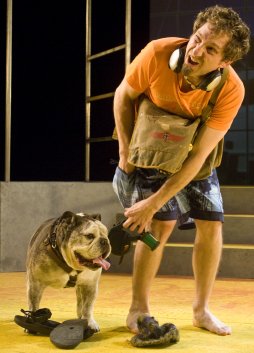
Goodwin begins with a non-textual prologue, as Chris Enweiler's hashish-baked Lance takes the stage as a pot-peddling surfer disc-jockey, mixing tunes for a pair of girls dancing on the club patio in silk mini-dresses. Lance, wearing a loose red shirt over blue swimming trunks and sandals, sports sunglasses and earphones along with curly sandy-brown hair, and his comically stuttered stoner laughs and vacuous lack of comprehension recall the burnt out Jeff Spicoli from Fast Times at Ridgemont High. Lance makes the usual admonishments against cell phones, cameras, and cellophane-wrapped candy in a "let's party" blur, then raps a little with dance gestures to the audience, thanking the crowd for coming to Shakespeare instead of buying tickets to the Michael Bublé concert. Enweiler's chin-bearded Lance makes later appearances accompanied by his surly bulldog Crab, a slobbering little brute with a perpetually sour expression and an arthritic limp, the perfect visual companion for the babbling stoner Lance. Iconic 1970s rock songs blare from the speakers as Lance and Crab appear - the guitar riff from Kansas' Carry on Wayward Son, Led Zeppelin's Ramble On, even Cocaine by Eric Clapton - and the always-perplexed Lance now ambles along in a do-rag, an orange tee-shirt, and flip-flops. Enweiler's gnarly performance delights, from his interaction with his counterpart Speed - who sports a scarf over a black suit, sneakers, and big black glasses - showing him his bagful of reefer joints and later a massive Cheech-and-Chong hash cigar, to his sputtering little asides ("he's kind of a knave") or defending the eating habits of the toothless Crab ("I like crusts").
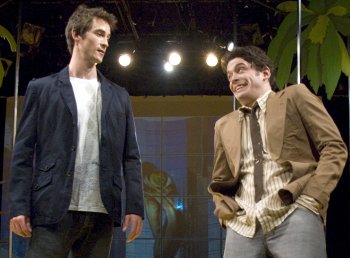
But the stars of a rom-com are the attractive lovers, and here the boys - Proteus and Valentine - are portrayed with boyish charm and tousled good looks. Attired in modern club wear - jeans, nice shirts - they wrestle outside Club Verona, sparring verbally as well as physically, and they swill beer and empty cocktail glasses in fraternity alcohol challenges as if still playing callow college drinking games. They seem like longtime friends and rivals, teammates and classmates, clowning with each other, slapping at each other, and challenging one another in testosterone-fueled horseplay. Their wrestling, teetering on the edge of homoerotic, becomes awkward, and when Proteus suddenly takes Valentine by the face and kisses him on the mouth. The moment ends quickly, not so much with discomfiture as with a closeted typicality that plays like their closeness is never spoken of aloud or acted upon further. The Brokeback Mountain moment lends their relationship some complexity, and despite the teenage romance shenanigans of a lightweight farce, even some interesting insight into late-play behavior that is otherwise difficult to reconcile. The two handsome young men laugh off the sudden affection as if they have done so often in the past, then begin discussing their conquests of girls. Proteus even shows Valentine a series of cell phone photographs - displayed on the upstage screen - of his supposedly beloved Julia, and chides his friend for his lack of a serious relationship.
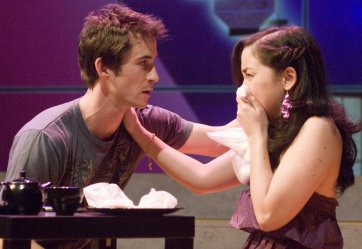
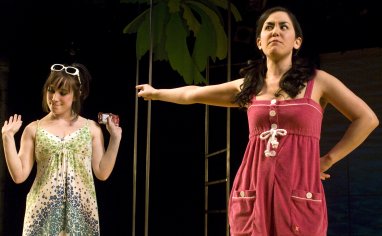
Goodwin then cuts to Julia's estate, her mansion announced in block letters upon the upstage screen, and the 1.2 interaction with her plucky sunglasses-wearing B. Lucetta. Hana Lass's pig-tailed Julia, a short-skirted dark-haired heroine with an earnest expression, reclines on a chaise lounge while Lucetta kneels upon a beach blanket. To distant sound effects of shore birds and crashing waves, they banter regarding a love letter from Proteus until Lass's Julia tears the actual pages to shreds in a proud dare, flinging the pieces to the stage, then kneeling in endearing lovesickness to apologize to each shred individually. The girls' later interaction takes place as if at a high school sleepover, as the sobbing Julia, wearing her pajamas and wrapped within a comforter, accepts tissues from a laconic Lucetta. Lucetta flips through a magazine while Julia struggles with her Twilight novel, the upstage wall adorned with a towering headshot of a brooding Robert Pattinson as well as posters from Eclipse and New Moon. In between these two scenes, Proteus tells Julia of his decision to leave Verona for Milan - cleverly mapped upstage in California - as they sit shoeless at a short table within a Japanese restaurant, while a kimono-wearing hostess brings the unintelligibly - but endearingly - sobbing Julia a series of hot towels within tongs to wipe her eyes and nose. Goodwin's directorial ingenuity and romantic comedy sensibility make for a slew of charmingly funny moments, such as the desperate-to-please Proteus removing a ring from his own nipple to serve as a love token for Lass's Julia, or later, once he's hopelessly smitten with Silvia, showing the finality of his breaking up with Julia by looking at images of her on his cell phone - of course projected upon the upstage screen - then deleting them one by one.
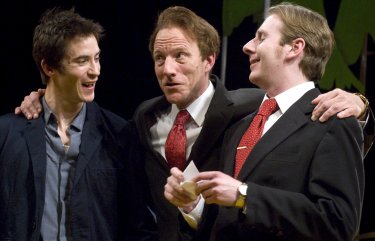
Goodwin's set is changed by three strutting ensemble members - sometimes beach bums, sometimes club-goers, later as The Wilds street gang members - and the 1.3 discussion between Proteus' father Antonio and a servant becomes a conference between an Eastern-European sounding west coast gangster in a white suit and his bodyguard muscle. Panthino, a bullish blond hit man in sunglasses and a red jump suit, wears a gold chain around his neck and a Bluetooth listening device in his ear. The comically English-challenged hit man shows cell phone imagery of a studious life in Milan to the mob boss, consulting a little red dictionary for quick translations to English. The later 3.2 attempted elopement is played within the upscale business offices of Silvia's father, the Duke, presiding over cigars and snifters of brandy. Connor Toms as Valentine provides one of the production's most delightfully amusing sequences, trying desperately to conceal the rope ladder beneath his sport jacket as well as his fear of his girlfriend's powerful father. Toms' preppie Valentine squeals a girlish scream in terror as the Duke snips a cigar with the sharp little cutter, his arms tight across his chest to conceal the ladder, and his failed attempts to sip brandy from this position recall a farcical Jim Carrey movie. His love Silvia, a sophisticated blonde heiress with expensive taste in fashion, is a distant and aloof narcissist strutting in high heels and mini-dresses, and he vies for her hand with the favored Thurio, a big business wanna-be who wears the same power suits as the Duke - right down to the crisp white shirt and blood-red neck tie - and comically emulates his boss's mannerisms and movements.
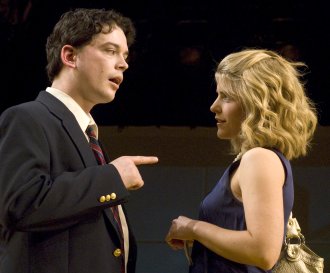
Daniel Brockley's wild-haired Proteus, the lean and reptilian - and conflicted - focal point of the story, arrives in Milan 2.4, and he and Valentine rush to an embrace that they hold for a comically uncomfortable long time, suddenly breaking apart and making their hug something of a wrestling maneuver. Brockley's Proteus becomes noticeably uneasy and unhappy with his best friend's exclamations of romantic passion for Silvia, and his bitter soliloquy and own supposed love for Silvia plumb the depths of a profound subtext: Proteus does not want Valentine to be in love with Silvia because he truly wants him for himself. Further, Proteus' sudden passion for Silvia smacks of superficial lust, and more deeply, a desire to simply keep her from Valentine. Brockley's handsome Proteus, barefoot on the beach before a backdrop of night-time surf, delivers the finest acting of the production 2.6, an anguished justification for the romantic backstabbing of his best friend, and he walks right into the audience to implore them for support.
With the 4.1 arrival of the Wilds, a street gang of southern California muggers brandishing a fork, a screwdriver, and a golf club as weapons, Goodwin's clever and winning modern farce teeters along the precipice of going too far into plain campy silliness. Toms' desperate Valentine flashes absurd gang signs at them, and Speed weeps openly when one gangbanger takes his scarf away. Somehow talking his way into becoming their leader, Toms' Valentine is crowned with a bicycle helmet lined with gold sports trophy pieces, while Lass's Julia arrives 4.2 in disguise as "Sebastian" in hat, vest, and tie, plus a glued-on goatee and a serious expression. She follows after her Proteus, who assists the hapless Thurio in a rapping hip-hop serenade of Silvia. While Silvia herself poses like an unimpressed supermodel upstage in a blue silk negligee beneath a floral robe, Thurio plucks at a ukulele while Proteus - now sporting a backward baseball cap and sunglasses - raps with a microphone, accompanied by deejay Lance and a bare-naveled backup singer/dancer. Goodwin recovers with a very funny 4.3, as Silvia implores an outrageous Sir Eglamour for help: the scene is staged as Eglamour responds via cell phone from a rowdy gay bar - "Thurio? Eeew!" - preening and posing comically with an equally flaming friend (who flips through a copy of Vogue), as club lights pulsate around them.
Shakespeare's notoriously difficult conclusion is also well played by Goodwin. Once the frustrated Proteus reaches a 5.4 breaking point of furiously mixed emotions, he strikes Julia across the face then turns Silvia as if to attempt rape from behind, but Valentine finally arrives to intervene. Toms' Valentine saves the day, pulling Proteus backward, then throwing him down and pinning him in a chorus of shouts and yells. Proteus rises but collapses into sobs - and is somehow forgiven without consequence by Valentine - and the two friends ultimately embrace as Julia and Silvia watch in outraged, jaw-dropped silence. When the two buddies traipse off happily side by side, the two dumbfounded heroines share a glance, spreading their hands in disbelief, and agree to exit together - in the opposite direction. When Proteus and Valentine return in wonderment, they completely fail to understand the problem, and shrug in confusion as the lights fade and music rises. Goodwin's production, save for some scattered too-far-over-the-top moments, plays as a wickedly entertaining romantic romp, cleverly modernized and with the unexpectedly cogent twist of a boyhood "bromance" crush.